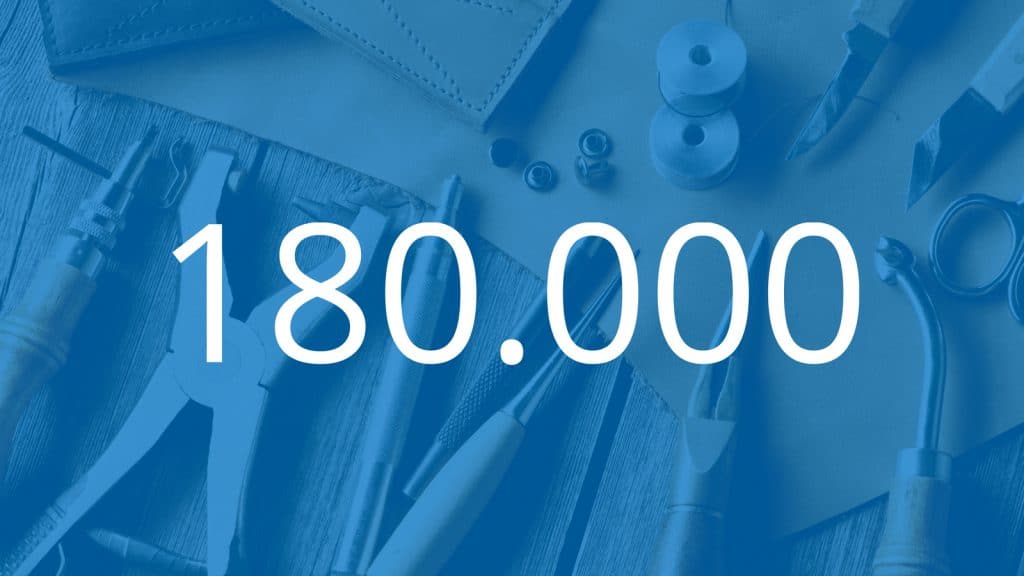Following the DIHK, the German Confederation of Skilled Crafts (ZDH) is now sounding the alarm. By 2020, more than 180,000 craft enterprises will be looking for a successor. This means that the shortage of skilled workers in the German skilled crafts sector will be followed by a shortage of entrepreneurs. The ZDH warns: “Without suitable successors at the top of the company, there is a threat of a loss of know-how, value creation and not least of training and labour in the skilled crafts sector.”
Unresolved business successions threaten craftsmen
The survey was conducted nationwide in cooperation with 40 chambers of crafts. Here are the most important results of the survey at a glance:
- Every fifth business is affected by company succession in the skilled crafts sector: Around 19 % of all owners want to hand over their business in the next five years. These are mostly larger businesses with more than five employees.
- Small businesses close more often: About one in fifteen craft enterprises (6.6%) will close within the next 5 years. This affects significantly more smaller craft enterprises with four or fewer employees. One reason for this is the widespread earnings weakness of these businesses.
- Difficult search for a suitable successor: Around one third of the owners of a medium-sized craft business with five to nineteen employees name the successful search for a successor as the biggest hurdle in the succession process.
- Determining the value of a company is difficult: Around 14% of all senior entrepreneurs face greater challenges in determining a realistic enterprise value. Around 40% of all companies have not yet carried out a valuation or do not see the need for one.
60% have not prepared for generation change
It is interesting that only about every fifth craftsman surveyed has drawn up a handover plan. Around 62 percent have not yet planned any measures or every sixth respondent did not provide any information on the status of handover preparations. “Good planning of a Company succession in the skilled crafts sector one of the key success factors for a successful generation change,” says Klaus-Christian Knuffmann, a consultant specialising in business succession in Krefeld.
It is particularly striking that every second respondent has not yet decided on the form of transfer or every third respondent has not given any information on the form of the planned transfer. However, the sale of the business is preferred by three to four times as many business owners as other forms of transfer such as gifting, leasing or annuity. The study thus supports the results of other studies which point out that fewer and fewer business successions are organised within the family.
Finding a successor is the central challenge for business succession in the skilled crafts sector
The biggest hurdle for a successful handover process for business owners in the skilled crafts sector is the search for a suitable successor. Every fourth business and every third business with 5-19 employees names the search for a successor as the greatest challenge in organising the handover. This lack of entrepreneurs is due, among other things, to demographic developments and the good labour market situation caused by the shortage of skilled workers.
Excessive values make handover difficult
Finally, determining the value of the business is another difficulty for every seventh craftsman. This is because many of the businesses turn to their tax advisors in succession matters, who in many cases resort to simpler and less expensive valuation procedures. By contrast, only 5% of all respondents use the income value-oriented procedures of the chambers of crafts or freelance business consultants. After all, almost 40% of the respondents do not consider a valuation to be necessary. This attitude is familiar to the consultant specialising in business succession in SMEs. Ingo Claus from his daily work: “A company valuation forces a transferor to deal very intensively with his company. An entrepreneur can not only develop a realistic purchase price expectation through an earnings value-oriented company valuation, but also already answers a whole series of questions from potential acquirers about his company as part of this process”.
You might also be interested in this:
Free webinars on business succession
German family entrepreneurs are on average 53 years old
Comment: Juniors’ shyness about the family business
Clarify important questions about business succession in advance
Interview: Preparing the succession within the family well

